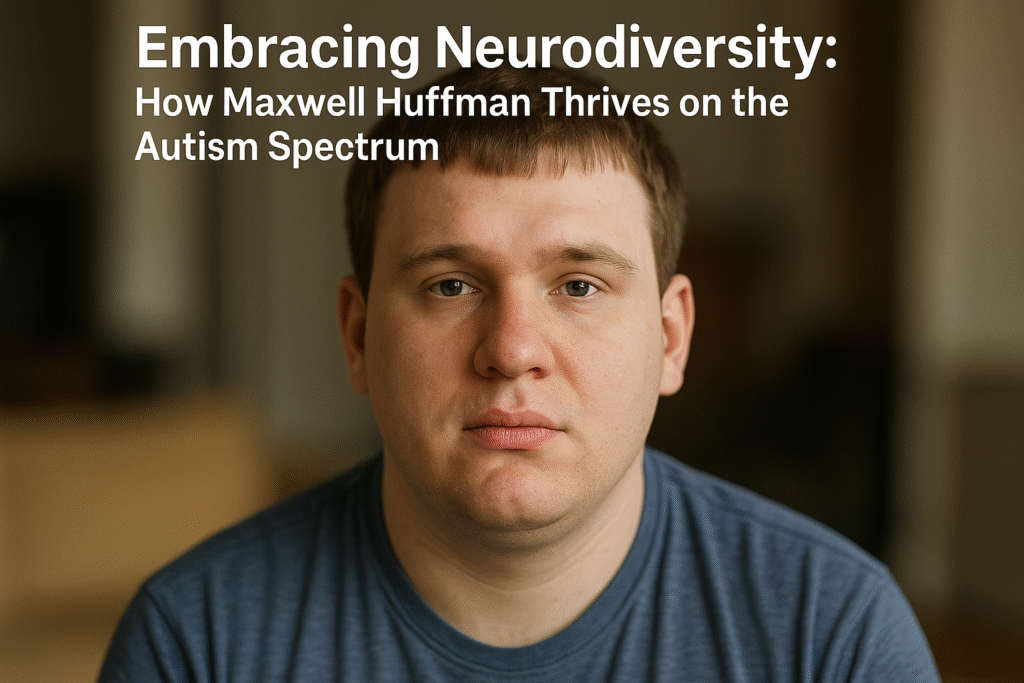By Harshit | September 25, 2025 | Chicago, IL | 4:00 AM CDT
From a young age, Maxwell Huffman noticed he experienced the world differently from his classmates. Sensory experiences, social interactions, and learning patterns didn’t always align with what others expected—but over time, those differences became his strengths. Diagnosed with autism as a teenager, Huffman has since carved out a successful career and advocates for greater acceptance of neurodiverse individuals.
Today, nearly 20 years later, Huffman serves as an executive at Aspiritech, a Chicago-based nonprofit dedicated to finding meaningful employment for people with autism and other neurodiverse conditions. The organization helps individuals develop careers in technology, software testing, and other professional fields while promoting inclusive workplaces.
A Personal Journey of Acceptance
Huffman’s path to self-acceptance has been as important as his professional achievements. “If you gave me a button right now that I could press that said ‘you’re no longer autistic,’ I wouldn’t press that button, because I like who I am,” he said. “I’m happy with who I am now.”
His experience mirrors that of many adults on the spectrum who view autism not as a limitation, but as a different lens through which to perceive and interact with the world. Advocates increasingly emphasize that embracing neurodiversity can unlock unique talents and perspectives in workplaces, classrooms, and communities.
Autism Awareness and Rising Prevalence
Recent studies indicate that autism spectrum disorder (ASD) diagnoses are increasing, reflecting both greater awareness and improved diagnostic methods. According to the U.S. Centers for Disease Control and Prevention, approximately 1 in 36 children in the United States is diagnosed with autism, up from 1 in 59 just a decade ago.
Experts caution that this rise does not necessarily mean autism itself is becoming more common, but that more children are being identified and supported. Early diagnosis and intervention, access to therapies, and societal understanding have all improved, creating opportunities for neurodiverse individuals to thrive.
The Importance of Inclusive Employment
Aspiritech exemplifies how workplace inclusion can benefit both neurodiverse individuals and employers. Many adults with autism face barriers to employment due to communication differences, social expectations, or outdated hiring practices. Organizations like Aspiritech provide structured environments, mentorship, and skill development tailored to each employee’s strengths.
Research has shown that neurodiverse teams can enhance innovation, problem-solving, and attention to detail. Huffman believes that creating these opportunities is not just beneficial for employees—it’s a strategic advantage for companies. “When you hire someone with autism, you get someone who often has incredible focus, creativity, and dedication,” he said.
Changing Perspectives on Autism
The neurodiversity movement challenges outdated notions that autism must be “cured” or eradicated. Many advocates, including Huffman, argue that society should focus on supporting individuals and adapting environments, rather than trying to eliminate differences.
Huffman’s story illustrates this philosophy in action. By embracing his neurodiverse identity, he has achieved career success, meaningful contributions to his community, and personal fulfillment. Experts suggest that such perspectives are essential for advancing educational, medical, and workplace policies that accommodate diverse needs without stigmatization.
Advocacy and Community Impact
Beyond his executive role, Huffman actively engages in advocacy, mentoring younger individuals on the spectrum and promoting awareness of autism in public forums. Organizations supporting neurodiversity, from local nonprofits to national initiatives, emphasize inclusion, equitable access to education, and the value of unique skills that neurodiverse individuals bring to society.
Communities that recognize and celebrate neurodiversity often report improved social cohesion, reduced stigma, and greater opportunities for individuals to contribute meaningfully. Huffman sees these efforts as critical not only for those with autism but for society as a whole.
Looking Ahead
As awareness of autism continues to grow, experts recommend a focus on acceptance, support, and opportunity. Early intervention, workplace inclusion, and education tailored to diverse learning styles remain key strategies. For Huffman and many like him, thriving on the spectrum is about leveraging unique strengths, building confidence, and fostering environments where neurodiverse individuals can succeed.
“Autism is not something to fear or fix,” Huffman said. “It’s part of who I am, and it’s shaped my life in ways that I value deeply. Society benefits when we recognize that difference is not a deficit.”







